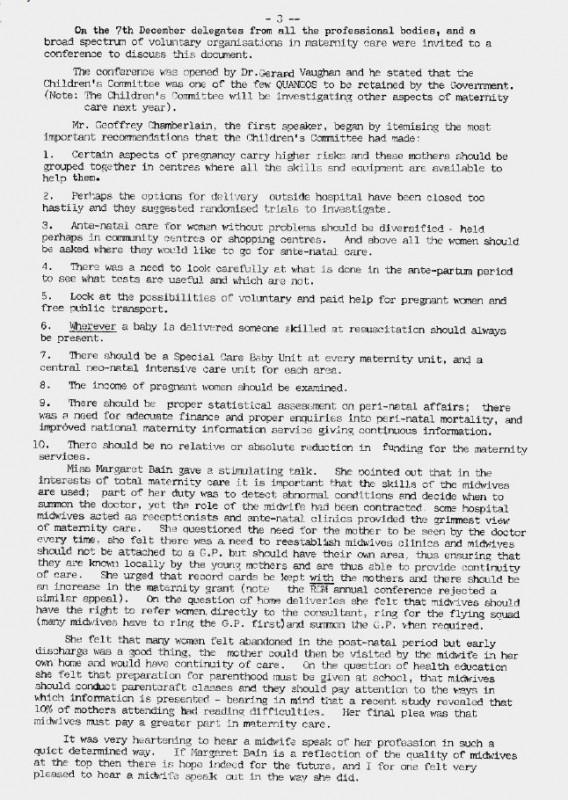AIMS Journal, 2010, Vol 22 No 4
Ishbel Kargar looks at AIMS Newsletters from the 70s and highlights the Winter of 1979
On the occasion of AIMS' 50th Anniversary, I was honoured to be asked to review some past Newsletters. The batch I received covered the decade of the 1970s, all published before I came back into midwifery after a gap of 25 years. Browsing through the fascinating typescripts, very reminiscent of ARM's early journals, I was impressed by the enthusiastic commitment of the AIMS' members to bring about improvements in maternity services. Few of these women had first hand experience from 'the side of the bed' as it were, but almost all had experienced 'being on the bed', and had plenty to say about it.
The Newsletter I chose for a more detailed comment was the Winter 1979 issue, and in particular the report of the 'Reduction of Perinatal Mortality & Morbidity' Conference (7 December 1979), at which Miss Margaret Bain was a speaker.
Some of her quotes:
'In the interests of total maternity care it is important that the skills of the midwives are used; part of her duty is to detect abnormal conditions and decide when to summon the doctor, yet the role of the midwife has been contracted' ... 'Antenatal clinics provide the grimmest view of maternity care' ... 'There is no need for the mother to be seen by the doctor every time' ... 'There is a need to re-establish midwives clinics, midwives should not be attached to a GP, but have their own area, ensuring they are known locally by young mothers, thus able to provide continuity of care' ... 'Record cards should be kept with the mothers' and 'the maternity grant should be increased,'
She noted that the RCM Annual Conference had rejected a similar appeal!
The above gives a flavour of her talk, many aspects of which were echoed in the rest of the articles in this and other AIMS Newsletters.
Browsing through the AIMS Newsletters for the 1970s, I noted the argumets, some resolved, others repeated ad nauseam with very little resolution of the problems. For instance, we still do not have universal 'midwives' clinics', most of the community midwives are still GP based. Another bone of contention is the lack of recognition of midwives' knowledge. It is widely known that when independent midwives transfer their clients into the local maternity unit, for legitimate reasons, their previous care is often disregarded by the hospital staff, who go through the 'new admission' procedure, with the resulting delays in dealing with the problem which prompted the transfer.
So what is my overall impression? First, a vote of thanks to AIMS for continuing to campaign for good maternity care for all women, and for refusing to sit back and be quiet. Secondly, a rather sad feeling that with the current strength of the vested interests in the NHS, the battle will not be won easily. But thirdly, a feeling of hope, engendered by the enthusiastic response of most women to the current demonstrated need for better health, which inevitably will come from better maternity care, and healthier mothers and babies.

The AIMS Journal spearheads discussions about change and development in the maternity services..
AIMS Journal articles on the website go back to 1960, offering an important historical record of maternity issues over the past 60 years. Please check the date of the article because the situation that it discusses may have changed since it was published. We are also very aware that the language used in many articles may not be the language that AIMS would use today.
To contact the editors, please email: journal@aims.org.uk
We make the AIMS Journal freely available so that as many people as possible can benefit from the articles. If you found this article interesting please consider supporting us by becoming an AIMS member or making a donation. We are a small charity that accepts no commercial sponsorship, in order to preserve our reputation for providing impartial, evidence-based information.
AIMS supports all maternity service users to navigate the system as it exists, and campaigns for a system which truly meets the needs of all.